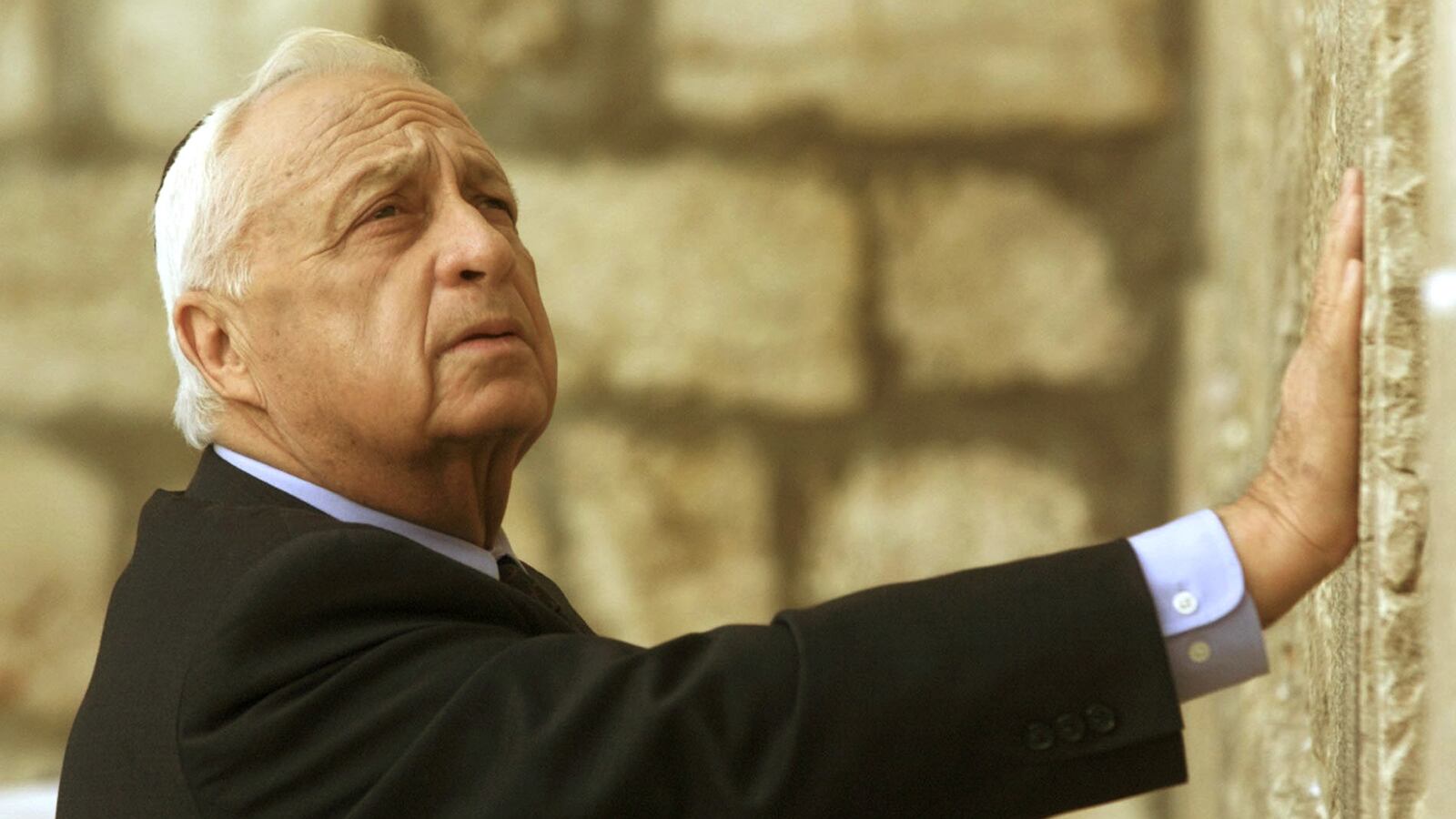One of my favorite glimpses of Ariel Sharon occurred one day some years ago at a breakfast at his farm in the Negev. He was then out of the center of things, having lost his post as defense minister. Yet every day people would show up at the farm to see him—on this morning a journalist or two, some Arab farmers, and some family.
As we were getting ready to repair to his capacious table, we were joined by Claude Lanzmann, the maker of the film Shoah. He entered Sharon’s living room, made his greeting, and then announced to his host that he was struck as he arrived at the farm by the absence of fences. “Yes,” Sharon replied, “I like to make the other guy build the fences.”
It’s but one of the encounters I’ve been reflecting on after the wires reported that Sharon’s health had taken a sharp turn for the worse, putting Israel’s eleventh prime minister near death after eight years in a stable, if comatose, state. No doubt Sharon did like to make the other side build the fences. But it’s also true that much of Israel’s West Bank barrier—a vast fence—went up during Sharon’s years as prime minister.
PHOTOS: The Life of Ariel Sharon

Sharon almost made it a strategy in life to avoid the trap of consistency. Often lampooned for being a right-winger, he was not, in fact, ideological. An architect of what is sometimes called “Greater Israel,” he may be the only Israeli leader to actually dismantle Jewish settlements—at Yamit after Camp David and at Gaza in 2005.
For a man who was often lionized on the right, Sharon had a tin ear on economics. The way it was joked about in free market circles is that someone would say to him, “General, don’t you think it would be a good idea to sell some of the state-owned industries?” He would vow to do so. “And what will your government do with the money?” he’d be asked. Sharon would reply: “We’ll buy more efficient state industries.”
Yet even that doesn’t quite catch the complexities. It was, after all, Sharon who installed at the finance ministry the man who, in Benjamin Netanyahu, made the free-market reforms that did so much to liberate Israel’s economy. It may have been politics more than economic theory that motivated Sharon to give Netanyahu a wide berth, but does that make him a giant or a sage?
I never bought the talk about Sharon’s duplicity, which became particularly rife in 1982, when he supposedly plunged deeper into Lebanon than Prime Minister Menachem Begin had intended. It happens that before the war, Sharon had come to America to alert the Reagan administration that at the next terrorist incident, he was going enter Lebanon to dismantle the terrorist camps there.
He also alerted the Wall Street Journal in an interview that was the first time I met Sharon. At one point in the visit, he did something that he’d do in nearly every meeting I attended with him—turn to an aide and ask for “the meps,” as he pronounced the word “maps.” The Journal printed two million copies of his warning that he would go into Lebanon and dismantle the terrorist infrastructure, which is what he proceeded to do.
Sharon lost the defense minister’s job after the massacre of Palestinian Arabs at the Sabra and Shatila camps in Lebanon. It was a terrible crime of which Sharon was innocent, though he was held indirectly responsible. The actual perpetrators ended up in the embrace of the regime in Damascus. Sharon ended up on his farm, where his years of political wilderness were similar in some ways to those experienced by, among other great leaders, Churchill and Reagan.
It was during this period that I glimpsed Sharon’s astonishing power to talk. He’d called me in Brussels, where I was based for the Wall Street Journal, and asked whether I could meet him in London. He was worried at the drift of things (America had begun talking with the Palestine Liberation Organization).
We met at the Dorchester Hotel, for what I expected would be a question and answer interview. I managed but one question—asking permission to use a tape recorder. Sharon proceeded to talk without interruption for two hours, warning of Saddam Hussein’s buildup of armor. The Wall Street Journal’s European edition filled an entire page with the result, which ran under the headline “The Soliloquy of Ariel Sharon.”
He also talked of the folly of Munich. Years later, when Israel was being asked to lay aside its own interests, Sharon would warn President George W. Bush that the Jewish state Israel would not be made to play the part of Czechoslovakia, when Israel was being asked to lay aside its own interests. Bush took umbrage, but got over it; he clearly had enormous regard for Sharon. They eventually set an example for a relationship between an Israeli premier and an American president that one can but hope for today.
And what an exuberance. Once Sharon stopped by the Journal for a meeting with its editors. It was conducted around a platter of pastrami sandwiches cut into quarters. Sharon ate them as if they were peanuts. Then he got into his armored limo for a ride uptown. He waited only two blocks before he suddenly ordered his driver to pull over to the side. He leapt out and strode over to a Hebrew National cart, returning with half a dozen hot dogs and some mustard. Nearing death, Sharon was reportedly down to a mere shadow of his former girth. It is one of the marks of his amazing lust for life that he hung on this long.





